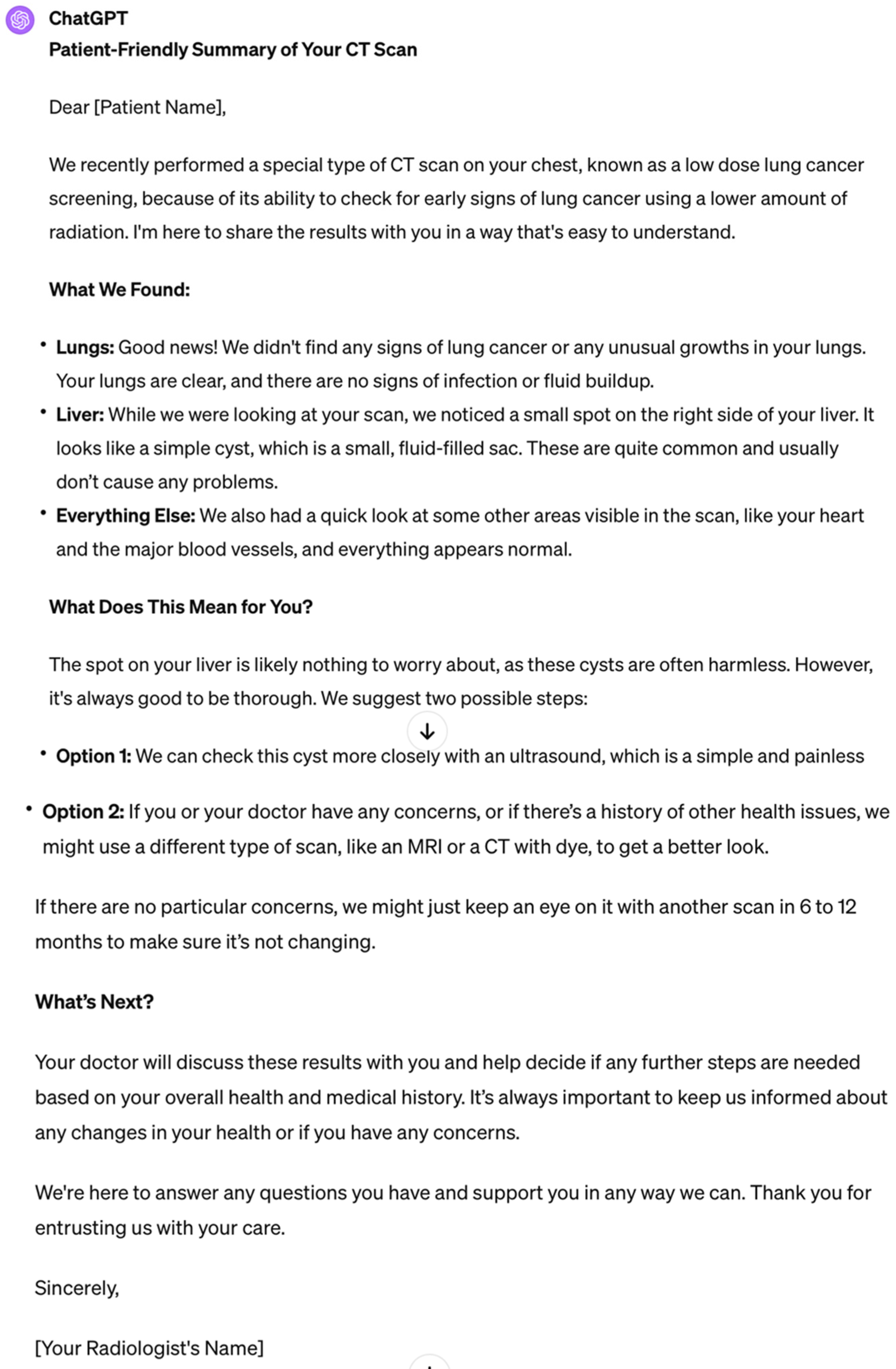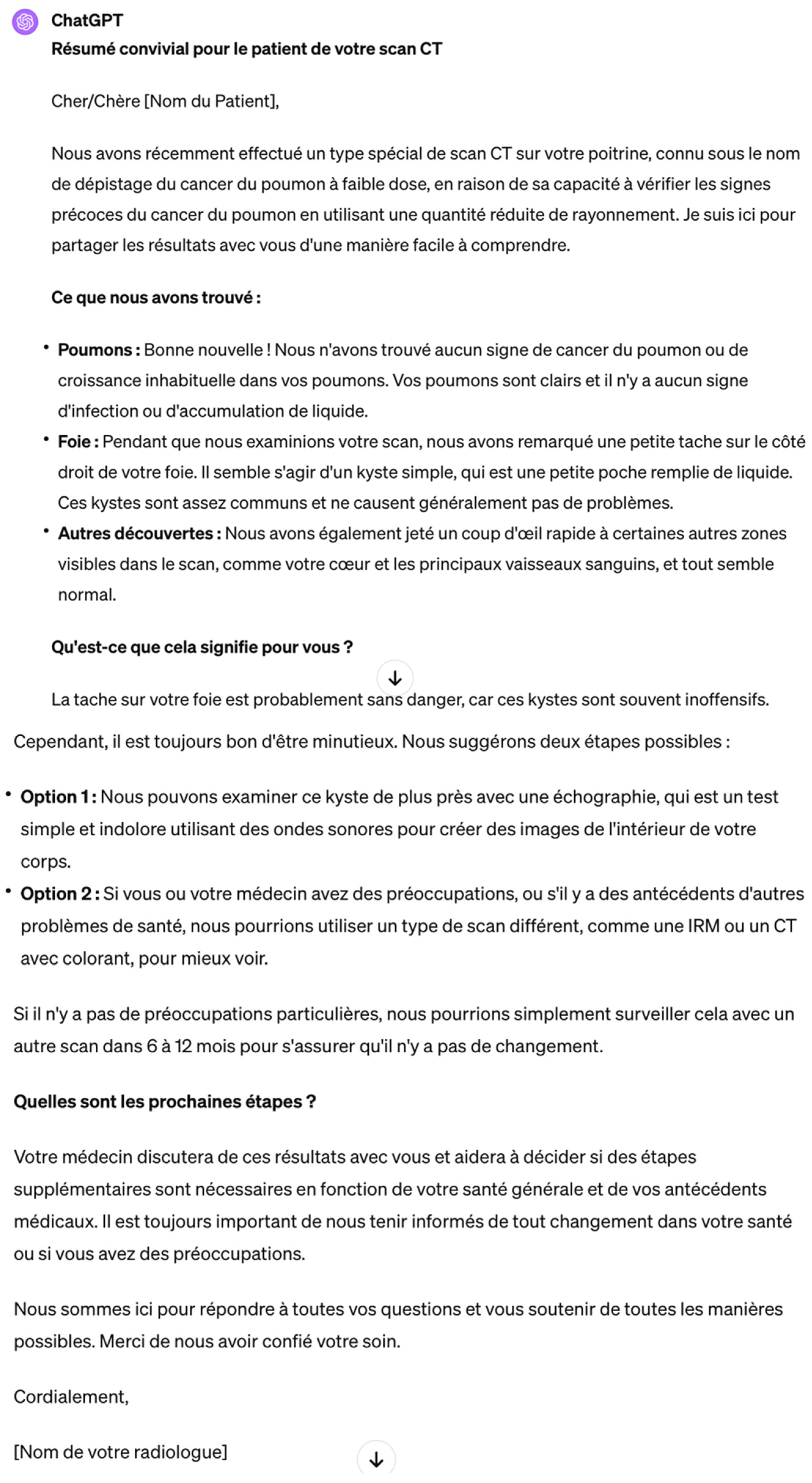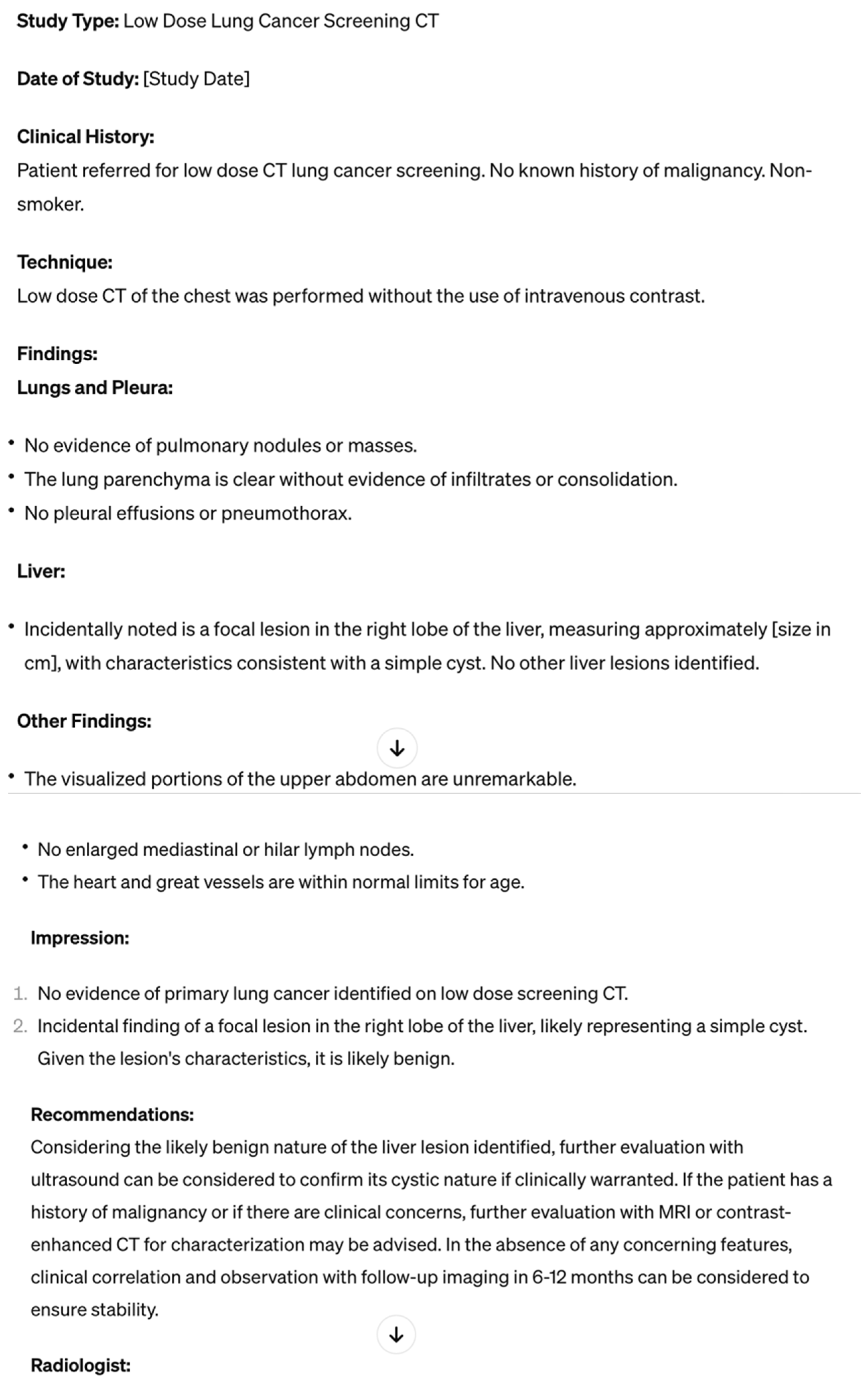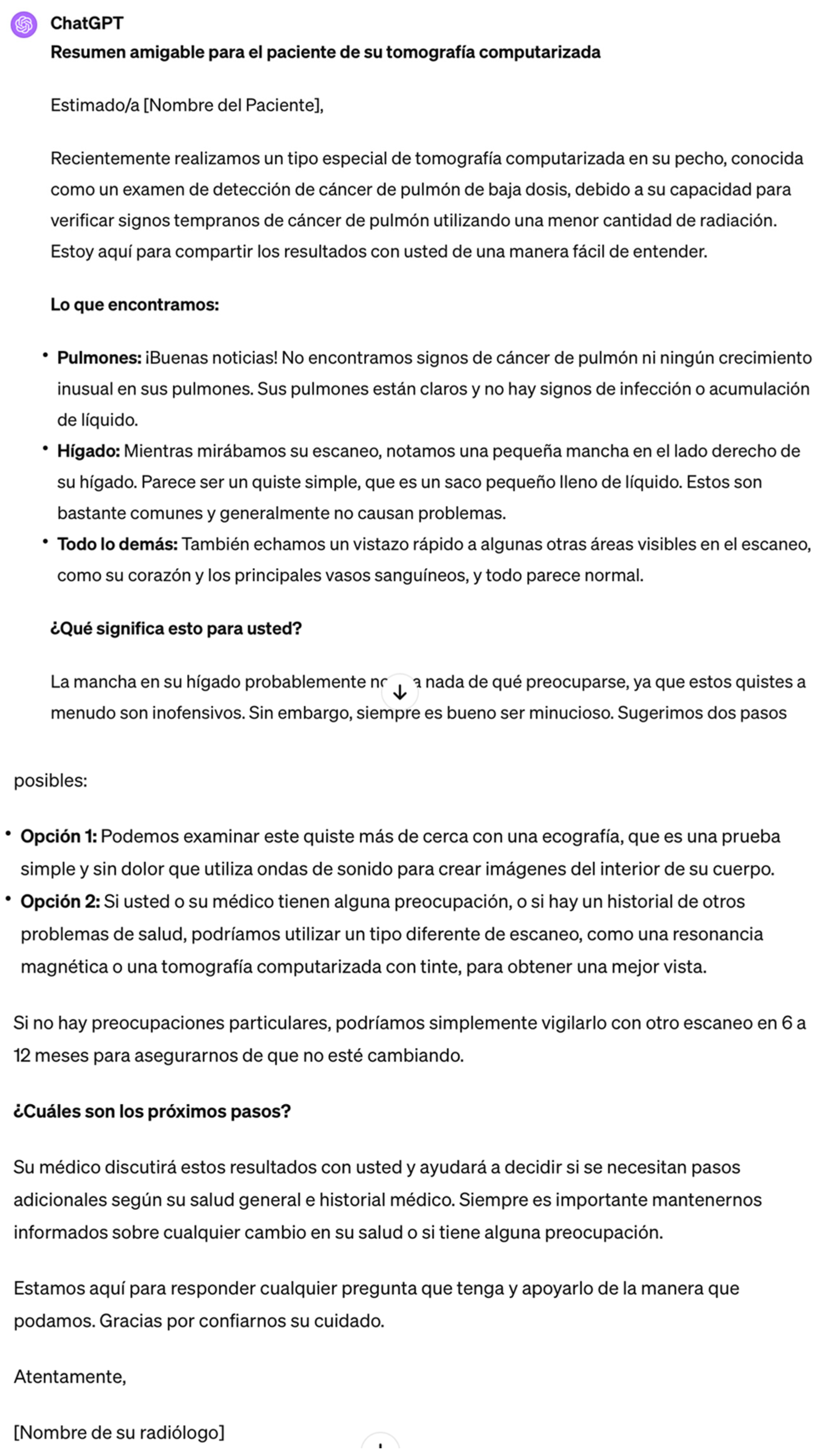Introduction
The ability of patients to understand their health records plays a critical role in their journey towards better health outcomes and satisfaction with their care. Clear comprehension of these records enables patients to actively participate in their treatment decisions, fostering a sense of empowerment and engagement. This engagement is crucial, as informed patients are more likely to adhere to treatment plans, ask insightful questions, and express concerns about their health, thereby facilitating a more collaborative and effective patient-provider relationship.
Specifically, when it comes to radiology reports, which often contain complex medical terminology and nuanced findings, patient understanding becomes even more vital. Radiology reports can significantly influence the course of a patient’s treatment plan, including diagnoses, follow-up procedures, and the overall management of their condition. Therefore, translating these reports into patient-friendly language can demystify the medical information, reduce anxiety associated with unknown or misunderstood terms, and enhance patients' ability to make informed decisions about their health care. Ultimately, the clarity provided by simplified radiology reports not only improves patient comprehension but also contributes to a more transparent and trustful patient-healthcare provider interaction, laying the foundation for improved health outcomes and patient well-being.
However, in the current scenario where radiologists are overburdened with their workload, it is not possible for them to add additional sections in the report containing a patient friendly summary. The emergence of GPT-4, an advanced artificial intelligence model, presents an unprecedented opportunity to reshape this landscape. This article explores the utility of GPT-4 in generating patient-friendly summaries of radiology reports, emphasizing its potential to make healthcare more accessible and patient-centric.
Patient Engagement in Healthcare:
Engaging patients in their healthcare has emerged as a pivotal strategy to enhance health outcomes, improve satisfaction, reduce costs, and benefit the clinician experience. As underscored by Krist et al. (1), patient and family engagement is conceptualized as active partnerships across various levels of the healthcare system, including direct care, organizational design, governance, and policymaking, aiming to ameliorate health and healthcare.
In the realm of decision-making, engaging patients has shown to increase satisfaction, knowledge, and adherence to treatment plans while reducing decisional conflict and unnecessary procedures. This evolution from informed consent to shared decision-making emphasizes a balanced exchange of information, respecting patients' values and preferences in the decision-making process.
Addressing the influence of social determinants on engagement and literacy, the disparities in patient engagement based on ethnicity, socioeconomic status, and other factors are acknowledged, suggesting the need for culturally competent and linguistically suitable communication and community engagement efforts to mitigate these disparities.
Patient Engagement in Radiology:
The importance of patient engagement in radiology is multifaceted and crucial for optimizing patient outcomes, enhancing the understanding of radiological findings, and fostering a collaborative healthcare environment. In the context of radiology, patient engagement extends beyond the mere delivery of imaging results, encompassing the comprehensibility of reports, access to and understanding of radiological information, and the implications of radiological findings on patient care and decision-making processes.
Cooper et al. (2) highlight the significance of shared decision-making (SDM) as a core component of patient- and family-centered care within radiology. SDM in radiology is identified through its major components: access to information, comprehension of information, appraisal of information, and application of knowledge in care decisions. This model emphasizes the role of radiologists in not only delivering imaging results but also in ensuring that patients understand their results and are able to participate actively in their care decisions. Radiologists are encouraged to facilitate patient access to imaging results, leverage multimedia reports to aid patient comprehension, and directly engage with patients to clarify findings and discuss next steps, underscoring the potential for radiology to contribute significantly to patient-centered care.
Trofimova et al. (3) discuss the opportunity to improve patient communication through the readability of radiology reports. The study identifies a gap in the current practice, where radiology reports, often filled with jargon and technical terminology, are not easily understood by patients. By advocating for reports written at a level that is accessible to patients, the authors suggest that radiology can play a pivotal role in enhancing patient understanding and engagement. This approach aligns with the broader goal of making radiology more patient-centered, by ensuring that patients are not only recipients of imaging services but active participants in understanding and acting upon their results.
These perspectives collectively underscore the evolving role of radiology in patient care. By adopting strategies aimed at improving access, comprehension, and engagement, radiology can significantly contribute to a healthcare model that values and prioritizes patient involvement. This shift not only has the potential to improve patient outcomes and satisfaction but also reinforces the critical role of radiology within the multidisciplinary healthcare team. Through these efforts, radiology can further cement its position as a key contributor to patient-centered care, enhancing the overall quality and effectiveness of healthcare delivery.
Large Language Models (LLMs) like GPT-4 can interpret and convert radiology reports which contain specialized terminology and complex descriptions, into simpler language and in multiple languages.
History and Evolution of GPT-4
The journey of Generative Pre-trained Transformer 4 (GPT-4) begins with the foundational advancements in artificial intelligence and natural language processing developed by OpenAI. Tracing its lineage back to the first GPT model unveiled in 2018, each iteration of GPT has marked a significant leap in AI's ability to understand and generate human-like text. The evolution from GPT to GPT-4 embodies a series of technological enhancements, with GPT-4 being the most sophisticated, built upon the revolutionary transformer architecture that introduced self-attention mechanisms. This allowed the model to process and generate text with unprecedented complexity and subtlety. GPT-4's development was grounded in the analysis of vast datasets, comprising diverse internet text, to capture the breadth of human knowledge and language nuances. Its predecessors, notably GPT-3, set new benchmarks for AI's capability in language comprehension and generation, enabling applications ranging from writing assistance to coding. GPT-4, with its further refined algorithms and expanded knowledge base, represents a quantum leap in AI's potential, particularly in specialized fields such as radiology. In this domain, GPT-4's advanced understanding of language and context translates into its ability to generate accurate, comprehensible summaries of complex radiological reports, thus bridging the gap between technical medical information and patient understanding. This progression underscores a broader trend of rapid advancement in AI technologies, with GPT-4 standing as a testament to the ongoing innovation and its transformative potential in healthcare and beyond.
GPT-4 and Patient-Friendly Summaries:
The utilization of Large Language Models (LLMs) like ChatGPT in generating patient-friendly summaries for radiology reports signifies a transformative step in enhancing patient comprehension and engagement in their healthcare. Radiology reports, traditionally designed for physician-to-physician communication, are laden with medical jargon and complex terminologies, rendering them challenging for patients to understand.
Asser Abou Elkassem et al (4) discuss the potential of ChatGPT in simplifying radiology reports. They detail how ChatGPT, through the prompt of translating medical texts into simpler language, can enhance the readability of radiology reports. The potential for improved patient engagement by enabling individuals interact with the model in a conversational manner is also discussed.
Li et al (5) provide an empirical analysis demonstrating significant improvements in readability scores when ChatGPT is used to simplify radiology reports across major imaging modalities. Their findings indicate a marked reduction in the Flesch-Kincaid reading level and an increase in the Flesch Reading Ease Score, underscoring ChatGPT’s efficacy in demystifying complex radiological information.
Figure 1 below is an example of a GPT-4 generated patient friendly summary for a patient who had a low dose lung cancer screening CT
Figure 1.
a: Original report describing an incidental lesion in the liver. b: Screenshot of the patient friendly summary generated by GPT-4.
Figure 1.
a: Original report describing an incidental lesion in the liver. b: Screenshot of the patient friendly summary generated by GPT-4.

Patient friendly summaries in several languages
In many countries, radiology reports are often written in English using specialized medical jargon intended for healthcare professionals across various fields. Given the wide range of health literacy and the diversity in patients' first languages, understanding these reports can be challenging for them. ChatGPT has the capability to produce reports for the general public, adapting them to various educational backgrounds and translating them into more than 40 languages (5). Reports tailored to a patient's specific health literacy and primary language could enhance their comprehension and enable them to actively engage with their healthcare providers. This engagement could lead to a collaborative effort in understanding their health issues and in the creation of personalized care strategies that align with their unique needs and preferences.
Figure 2 below shows GPT-4 generated patient friendly summaries for the same report used in
Figure 1
Figure 2.
a: GPT-4 generated Patient friendly summary in Spanish. B: GPT-4 generated patient friendly summary in French.
Figure 2.
a: GPT-4 generated Patient friendly summary in Spanish. B: GPT-4 generated patient friendly summary in French.

Risks and pitfalls
This article highlights the potential of advanced language models such as GPT-4 to significantly improve patients’ understanding of radiology reports and their engagement. Yet, it's important to note that these models are not currently recognized as regulated medical devices, and their application in healthcare necessitates rigorous oversight, evaluation, and confirmation by medical experts for each specific scenario.
One notable limitation of GPT-4 involves the occurrence of "hallucinations," where the model might produce compelling but incorrect or fabricated details, potentially leading to erroneous interpretations. The protection of data privacy stands out as a critical issue, especially considering the confidential nature of medical information; it is crucial to ensure that GPT-4 adheres to strict data privacy laws such as HIPAA to protect patient privacy. Additionally, ethical concerns, particularly regarding patient consent and the clarity of decisions made by AI, are prominent. It is imperative that patients are fully informed about the possibility of GPT-4 making mistakes and outlining steps to minimize such risks.
Conclusions
In conclusion, the advent of Generative Pre-trained Transformer 4 (GPT-4) presents a potential breakthrough in enhancing the clarity and accessibility of radiology reports for patients. This technology can revolutionize patient engagement by translating complex medical information into simplified, understandable summaries, thereby empowering patients to actively participate in their healthcare decisions. This review underscores the importance of patient-centric approaches in radiology, highlighting how GPT-4 can contribute to a more informed patient community and foster a collaborative relationship between patients and healthcare providers.
However, the integration of GPT-4 and similar AI technologies in healthcare is not without challenges and risks. This article points to the need for rigorous oversight and ethical considerations, including safeguarding data privacy and ensuring the accuracy of AI-generated content to avoid misinterpretations that could affect clinical decision-making.
Ultimately, GPT-4 represents a promising tool in the shift towards more transparent and patient-cantered healthcare. By facilitating better understanding and engagement, it holds the potential to improve healthcare outcomes and patient satisfaction significantly. Yet, its successful implementation will require careful consideration of the ethical, privacy, and oversight challenges outlined in this review.
References
- Krist, A. H., Tong, S. T., Aycock, R. A., & Longo, D. R. (2017, June 26). Engaging patients in decision-making and behavior change to promote prevention. Information Services & Use, 37(2), 105–122. [CrossRef]
- Cooper, K. , Heilbrun, M. E., Gilyard, S., Vey, B. L., & Kadom, N. (2020, January). Shared Decision Making: Radiology’s Role and Opportunities. American Journal of Roentgenology, 214(1), W62–W66. [CrossRef]
- Trofimova, A. , Vey, B. L., Safdar, N. M., Duszak, R., & Kadom, N. (2018, August). Radiology Report Readability: An Opportunity to Improve Patient Communication. Journal of the American College of Radiology, 15(8), 1182–1184. [CrossRef]
- Elkassem, A. A., & Smith, A. D. (2023, September). Potential Use Cases for ChatGPT in Radiology Reporting. American Journal of Roentgenology, 221(3), 373–376. [CrossRef]
- Li, H. , Moon, J. T., Iyer, D., Balthazar, P., Krupinski, E. A., Bercu, Z. L., Newsome, J. M., Banerjee, I., Gichoya, J. W., & Trivedi, H. M. (2023, September). Decoding radiology reports: Potential application of OpenAI ChatGPT to enhance patient understanding of diagnostic reports. Clinical Imaging, 101, 137–141. [CrossRef]
|
Disclaimer/Publisher’s Note: The statements, opinions and data contained in all publications are solely those of the individual author(s) and contributor(s) and not of MDPI and/or the editor(s). MDPI and/or the editor(s) disclaim responsibility for any injury to people or property resulting from any ideas, methods, instructions or products referred to in the content. |
© 2024 by the authors. Licensee MDPI, Basel, Switzerland. This article is an open access article distributed under the terms and conditions of the Creative Commons Attribution (CC BY) license (http://creativecommons.org/licenses/by/4.0/).







